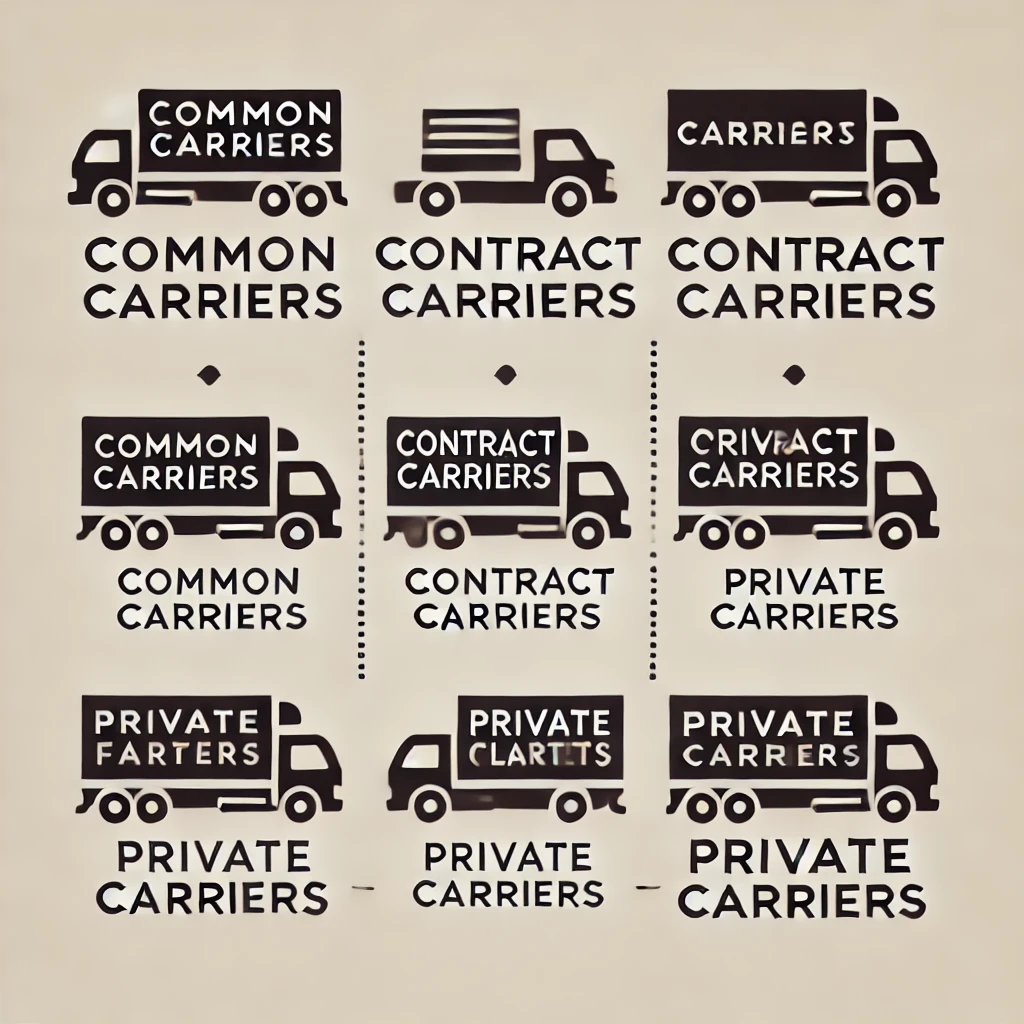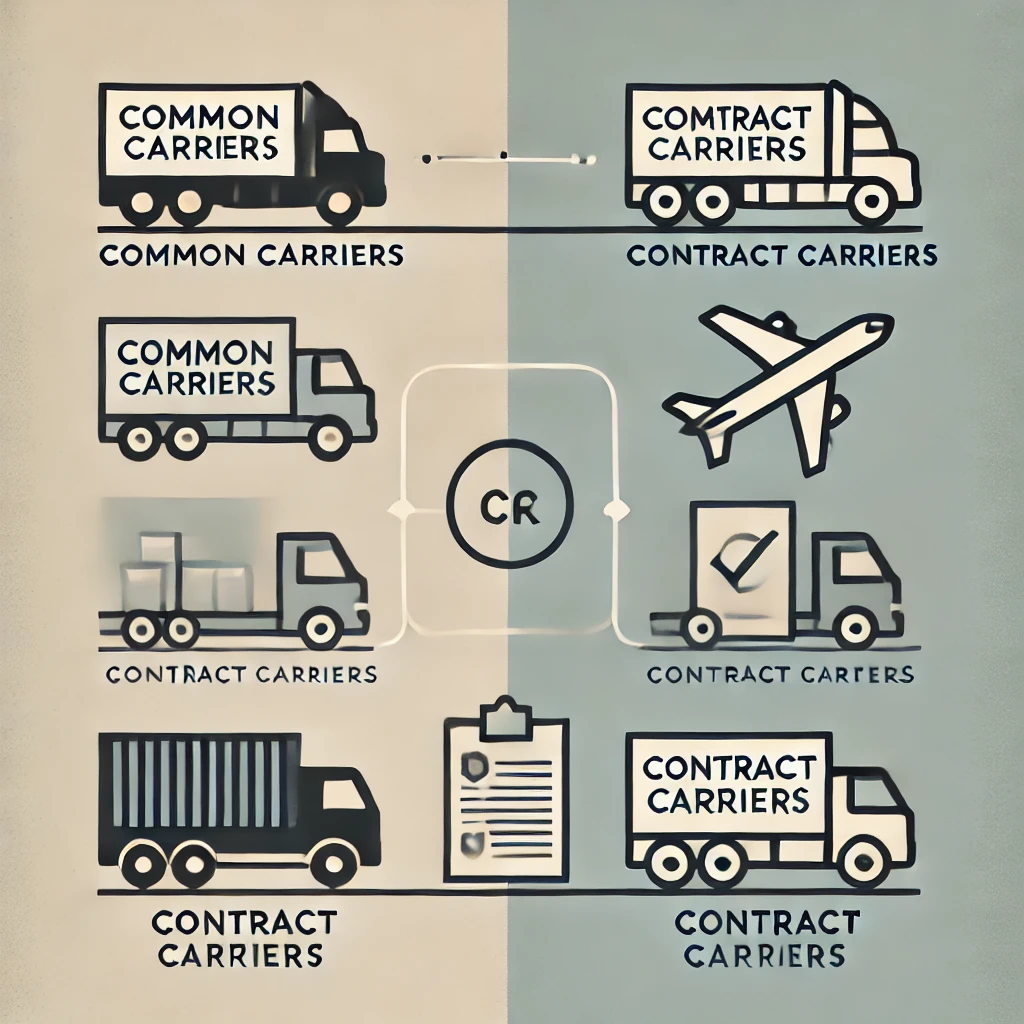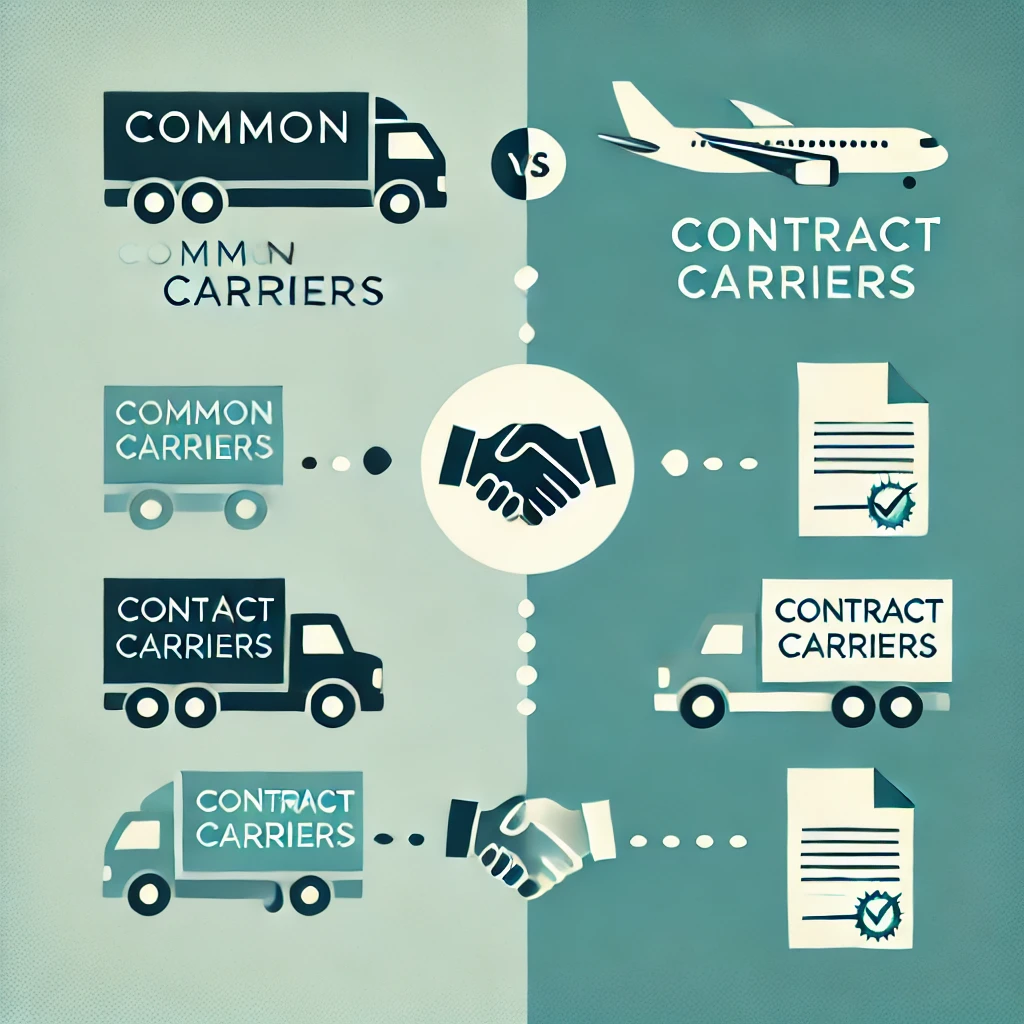Common Carrier vs Other Carrier Types: Understanding the Differences in Transportation Services

Key Takeaways:
- Common carriers serve the general public, while contract carriers serve specific clients
- Legal obligations and liabilities differ between common and contract carriers
- The choice between common and contract carriers depends on specific business needs
- Regulatory environments vary for different carrier types
- Understanding these differences is crucial for efficient supply chain management
Defining Common Carriers and Contract Carriers
Before diving into the comparison, let’s define these two important terms:
Common Carrier
A Common Carriers vs Other Carrier Types is a business that transports people or goods for a fee and offers its services to the general public. Examples include:
- FedEx
- UPS
- Major airlines
- Trucking companies that serve the general public
Contract Carrier
A contract carrier, also known as a private carrier, provides transportation services to specific clients under individual contracts. Examples include:
- Dedicated fleet services for large retailers
- Specialized transportation companies serving particular industries
- Some less-than-truckload (LTL) carriers operating under contracts
Key Differences: Common Carrier vs Contract Carrier
Let’s break down the main differences between these two types of carriers:
- Availability of Service
- Common Carrier: Open to the general public
- Contract Carrier: Serves specific clients under contract
- Regulatory Oversight
- Common Carrier: Subject to stricter regulations and oversight
- Contract Carrier: Generally faces fewer regulatory requirements
- Liability
- Common Carrier: Often held to a higher standard of liability
- Contract Carrier: Liability terms are often negotiated in the contract
- Pricing
- Common Carrier: Typically has published rates
- Contract Carrier: Rates are usually negotiated and can be more flexible
- Service Customization
- Common Carrier: Offers standardized services
- Contract Carrier: Can provide more tailored services to meet client needs
- Obligation to Serve
- Common Carrier: Must serve all customers without discrimination (within reason)
- Contract Carrier: Can choose its clients and refuse service to others
- Insurance Requirements
- Common Carrier: Often subject to higher minimum insurance requirements
- Contract Carrier: Insurance requirements may be more flexible, often specified in contracts
- Availability of Service
Advantages and Disadvantages of Each Carrier Type
Understanding the pros and cons of Common Carriers vs Other Carrier Types vs contract carriers can help businesses make informed decisions:
Common Carrier Advantages
- Widely available and accessible
- Standardized services and rates
- Often have extensive networks and resources
- Suitable for businesses with varying shipping needs
Common Carrier Disadvantages
- Less flexibility in service customization
- Potentially higher costs for some services
- May not cater to specialized shipping requirements
Contract Carrier Advantages
- Customized services tailored to client needs
- Potentially lower costs due to negotiated rates
- Dedicated capacity and resources for the client
- More control over shipping processes
Contract Carrier Disadvantages
- Limited to contracted clients
- May have less extensive networks
- Potential for dependency on a single service provider
- Contracts may limit flexibility to change carriers quickly
When to Use a Common Carrier vs a Contract Carrier
The choice between a common carrier and a contract carrier depends on various factors:
Consider a Common Carrier When:
- You have diverse shipping needs
- Your shipping volume fluctuates
- You need access to a wide range of services
- You prefer standardized processes and published rates
Consider a Contract Carrier When:
- You have consistent, high-volume shipping needs
- You require specialized transportation services
- You want more control over the shipping process
- You can commit to long-term contracts for potentially better rates
Private Carriers: Another Alternative
In addition to common carriers and contract carriers, it’s worth mentioning private carriers:
Private Carrier Definition
A private carrier is a company that transports its own goods as part of its business operations, rather than offering transportation services to others.
Characteristics of Private Carriers:
- Operated by the company whose goods are being transported
- Not for hire by other businesses or the public
- Subject to different regulations than common or contract carriers
- Offers maximum control over the transportation process
Examples of Private Carriers:
- Walmart’s private fleet for store deliveries
- Coca-Cola’s distribution trucks
- Home improvement stores delivering materials to job sites

Impact of Carrier Type on Shipping Costs and Services
The choice between common carrier vs contract carrier (or private carrier) can significantly impact a business’s shipping costs and service quality:
- Cost Structure
- Common Carriers: Generally have published rates, but may offer volume discounts
- Contract Carriers: Rates are negotiated, potentially leading to cost savings for high-volume shippers
- Private Carriers: Costs are internalized, which can be more economical for very high volumes
- Service Customization
- Common Carriers: Offer standardized services with limited customization
- Contract Carriers: Can provide highly customized services tailored to client needs
- Private Carriers: Offer maximum customization as the service is entirely in-house
- Capacity Availability
- Common Carriers: Capacity can fluctuate based on overall market demand
- Contract Carriers: Often provide dedicated capacity as part of the contract
- Private Carriers: Capacity is fixed based on the company’s fleet size
- Geographic Coverage
- Common Carriers: Usually offer extensive geographic coverage
- Contract Carriers: Coverage may be more limited or specialized
- Private Carriers: Coverage is limited to the company’s operational area
Regulatory Differences Between Carrier Types
The regulatory environment differs significantly between common carriers and contract carriers:
Common Carrier Regulations
- Subject to strict non-discrimination rules
- Often required to file tariffs (published rates) with regulatory agencies
- May need to obtain certificates of public convenience and necessity
- Subject to specific safety and operational standards
Contract Carrier Regulations
- Generally face fewer regulatory requirements
- Not subject to Common Carriers vs Other Carrier Types non-discrimination rules
- Usually don’t need to file public tariffs
- Still subject to basic safety and operational standards
Private Carrier Regulations
- Subject to general transportation safety regulations
- Not regulated as for-hire carriers
- May face different insurance and licensing requirements

How Businesses Choose Between Common and Contract Carriers
When deciding between a common carrier vs contract carrier, businesses consider several factors:
- Shipping Volume: High-volume shippers may benefit more from contract carriers
- Consistency of Needs: Regular, predictable shipping favors contract carriers
- Specialization Required: Unique needs may be better served by contract carriers
- Geographic Scope: Broad coverage needs might favor common carriers
- Budget Considerations: Long-term contracts with contract carriers can offer cost savings
- Flexibility Requirements: Changing needs might be better served by common carriers
- Risk Tolerance: Common carriers may offer more stability and predictability
Case Studies: Real-World Examples of Different Carrier Types in Action
Let’s examine some real-world scenarios to illustrate the common carrier vs contract carrier decision:
Case Study 1: E-commerce Retailer
An online retailer ships varying volumes of packages to customers nationwide. They choose to use common carriers like UPS and FedEx for their extensive networks and standardized services.
Case Study 2: Automotive Parts Manufacturer
A car parts manufacturer needs to ship large volumes of parts to specific assembly plants on a regular schedule. They opt for a contract carrier to ensure dedicated capacity and tailored services.
Case Study 3: Grocery Chain
A regional grocery chain operates its own fleet of trucks to deliver goods from distribution centers to individual stores, functioning as a private carrier for optimal control over their supply chain.

Future Trends in Carrier Classifications and Services
The landscape of transportation services is evolving, blurring the lines between common carrier vs contract carrier:
- Technology Integration: Both carrier types are adopting advanced technologies for tracking and optimization
- Sustainability Focus: Increasing emphasis on eco-friendly practices across all carrier types
- Last-Mile Innovation: New solutions for final delivery are emerging, applicable to both common and contract carriers
- Regulatory Changes: Evolving regulations may affect the distinctions between carrier types
- Hybrid Models: Some carriers are offering both common and contract services to meet diverse needs
- Automation and AI: The rise of autonomous vehicles may reshape the entire carrier landscape
- Gig Economy Impact: Crowdsourced delivery services are introducing new models to the industry
Conclusion: Navigating the Complex World of Carriers
The choice between a Common Carriers vs Other Carrier Types vs contract carrier is not always straightforward. Each type of carrier offers distinct advantages and comes with its own set of considerations. Understanding these differences is crucial for businesses looking to optimize their supply chain and transportation strategies.
Common carriers offer the advantage of widespread availability, standardized services, and extensive networks. They’re often the go-to choice for businesses with diverse or fluctuating shipping needs. On the other hand, contract carriers provide the benefits of customized services, potentially lower costs for high-volume shippers, and dedicated resources.
The decision ultimately depends on a business’s specific needs, including shipping volume, consistency, specialization requirements, geographic scope, budget constraints, and desired level of control over the shipping process. In some cases, a combination of carrier types might be the optimal solution.
As the transportation industry continues to evolve with technological advancements and changing regulatory landscapes, the distinctions between carrier types may shift. Businesses must stay informed about these changes and remain flexible in their approach to carrier selection.
Whether you choose a common carrier, contract carrier, or even operate as a private carrier, the key is to align your transportation strategy with your overall business goals. By understanding the nuances of each carrier type, you can make informed decisions that enhance your supply chain efficiency, reduce costs, and ultimately improve customer satisfaction.
